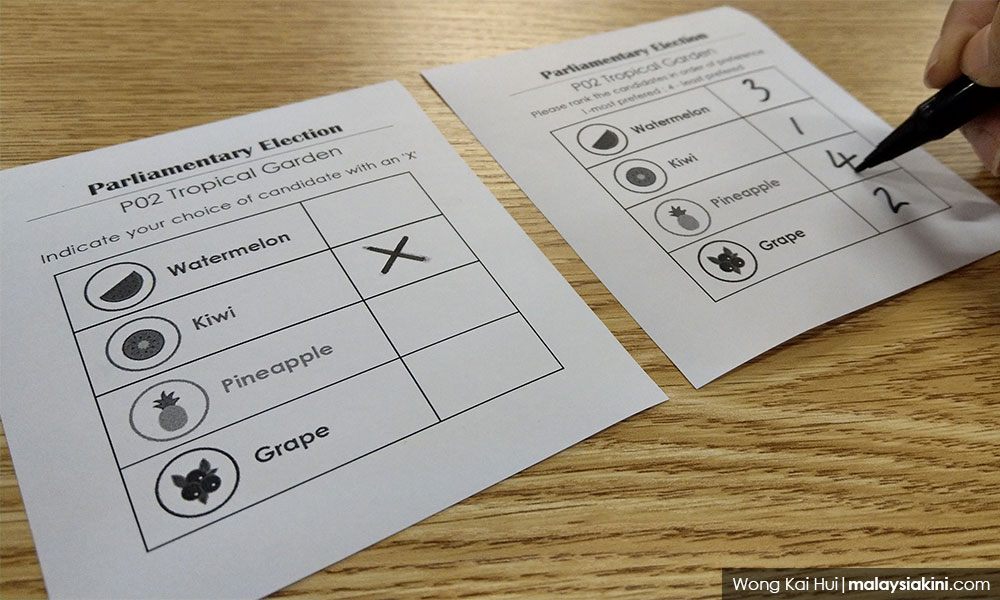
SPECIAL REPORT | In order to encourage positive change to Malaysian politics, academics and activists have long suggested reforming the country’s electoral system.
Previous suggestions have centred around adopting a Mixed-Member Proportional (MMP) Representation system, similar to that used by Germany.
However, an alternative system aimed at encouraging political moderation has recently been suggested by an Australian academic.
The preferential voting system was proposed by Benjamin Reilly, a professor from the University of Western Australia, during a visit to Malaysia last month.
The political scientist, who specialises in electoral system design and reform, revealed that he shared his advice with the Electoral Reform Committee (ERC) on May 31.
"From the discussion we have been having with the Electoral Reform Committee, there doesn't seem to be a great deal of enthusiasm for major electoral reform to do away with the single-member district (system) that would require constitutional change.
"The reform proposal involving the preferential voting system could probably be done more easily, and without constitutional change," he said in a joint interview with selected media.
"It is a modification of the existing First Past the Post (FPTP) system, and in many ways, it would probably deliver a similar result, so it is not a big change, it shouldn't require constitutional change."
"It just requires some changes in the election regulations, in terms of how they count the votes, but it is a modest change that may have some positive impact in terms of electoral incentive."
The electoral system can be understood as a system of how to convert votes into seats. But, what is this preferential voting system? And how can it provide a so-called 'positive incentive' to improve our current system?
What is preferential voting?
In Malaysia’s current FPTP system, the voters need to mark their ballot papers to choose "one" candidate to indicate he or she is their first and only choice. If voters choose more than one candidate, the ballot will be considered a spoilt vote.
However, in the case of a preferential voting system, the voters will have to rank the candidates according to their preferences, which is also known as "ranked choice voting".
For the counting process, in FPTP, the candidate who receives the most votes wins, even if the victor merely defeats other candidates by one vote. This is known as winning by a "simple majority".
In a preferential voting system, the counting process is slightly more complicated. There may be a process of elimination, and the candidate needs to receive an "absolute majority" to win.
A candidate who is ranked first on a ballot paper is considered to have received the first-preference, or primary, vote. If no candidate secures an absolute majority of primary votes, the candidate with the fewest votes is then eliminated from the count.
The votes for this eliminated candidate are then redistributed among the remaining candidates, according to the second preference indicated on the original ballot.
This process of elimination continues until a candidate secures an absolute majority. It means every vote will still be counted, even if their top candidate choice is eliminated due to a lack of votes.
In a nutshell, a winner in the FPTP system only needs to secure a simple majority, whereas a winner in the preferential voting system needs to secure an absolute majority, or more than 50 percent of the vote.
Let's look at the following example, set in the fictional parliamentary seat of Tropical Garden, which has a total of 100 voters.
According to the preferential voting system, the voters in Tropical Garden need to rank four candidates in order of preference on their ballot papers (example below).
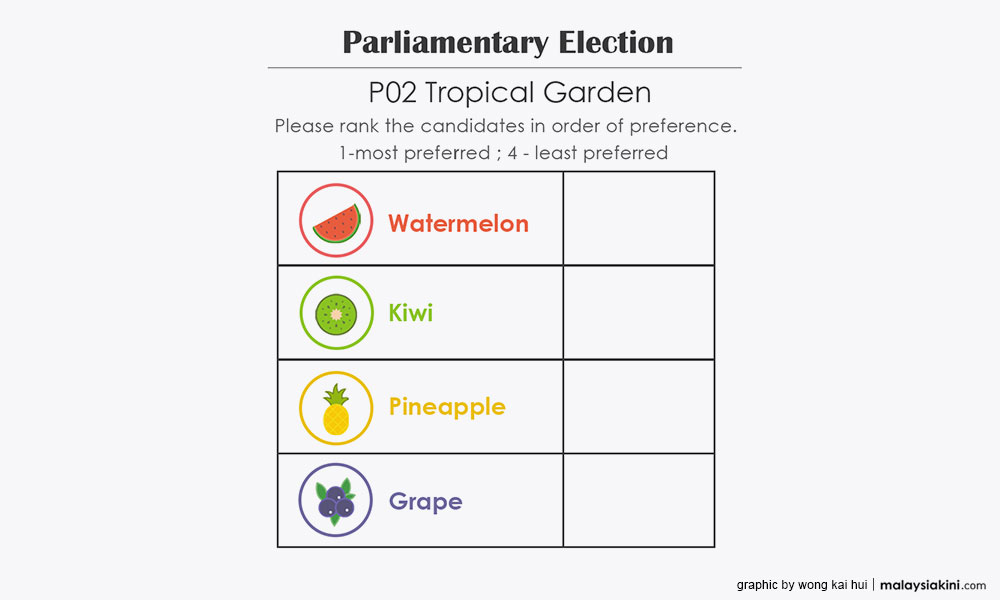
In the counting process, the first-preference votes are counted first.
According to the results shown in the graph below, Watermelon receives 39 votes, Kiwi receives 35 votes, Pineapple receives 20 votes and Grape receives 6 votes.
No candidate secured the minimum 51 percent of votes needed to win the election, which in Tropical Garden’s case, translates to exactly 51 votes. As such, a second round of counting is launched.
In the second round of counting, the candidate with the fewest votes from the first round is eliminated. The votes he or she won is then redistributed among the remaining candidates, according to who was ranked as the voters’ second preference on the ballots.
In this round, Watermelon gets 1 more vote, Kiwi gets 3, and Pineapple gets 2.
Therefore, Watermelon has now secured 40 votes, while Kiwi has 38, and Pineapple has 22.
However, there is still no candidate who has secured an absolute majority. Therefore, a third round of counting is required.
The next candidate with the fewest votes, Pineapple, is now eliminated. Pineapple’s 22 votes are then redistributed to the remaining candidates, namely Watermelon or Kiwi, according to the voters’ third preference on the ballots (or according to the fourth preference, if the voters’ third pick has been eliminated).
After the third round of counting, Watermelon has a total of 47 votes, while Kiwi has a total of 53 votes.
Hence, Kiwi, who received 35 percent of the first-preference vote, is the final winner.
In the FPTP system, the counting process would have stopped at the first round. Watermelon would have claimed victory with 39 percent of the vote.
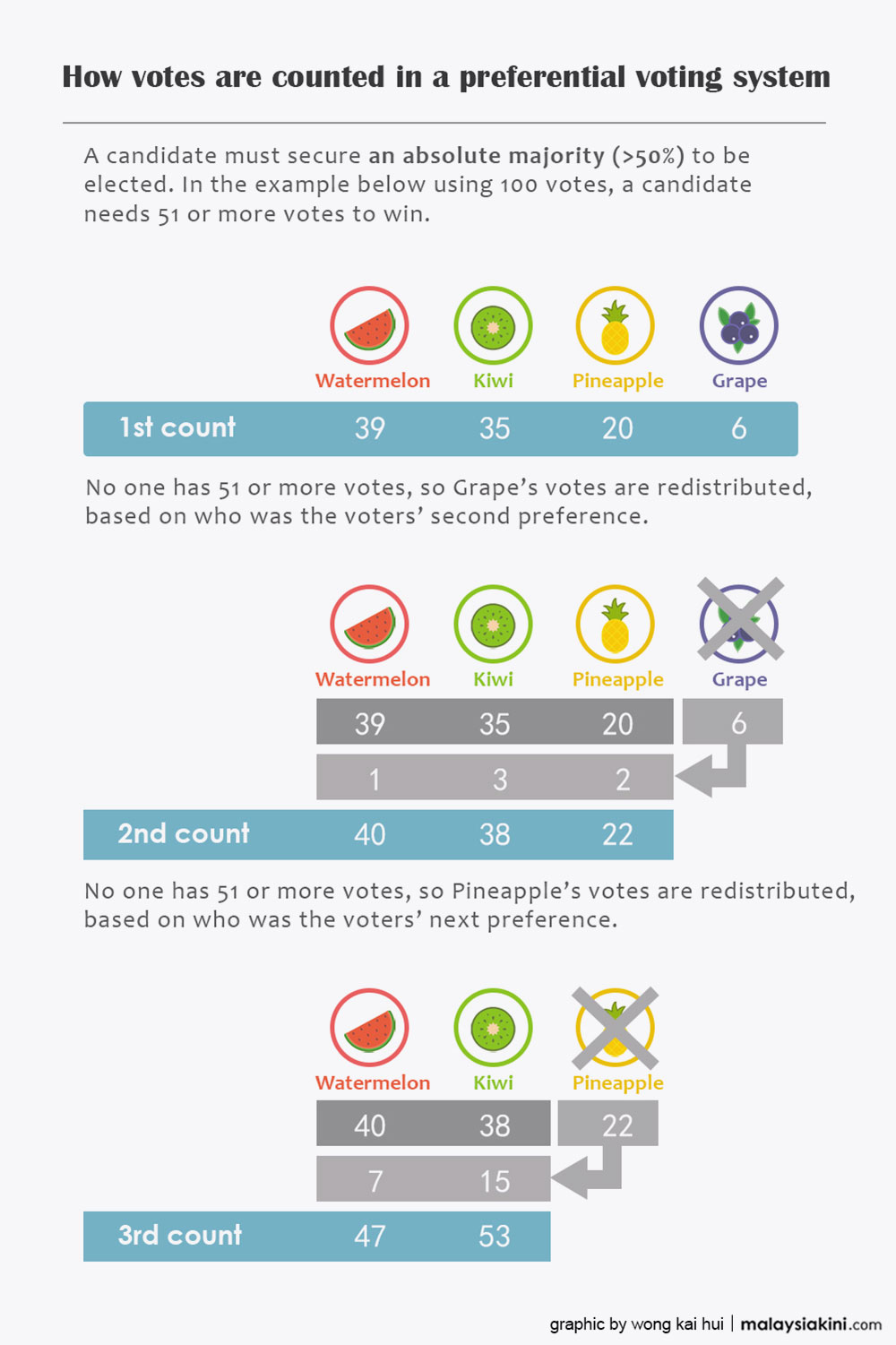
A simplified version: the Supplementary Vote
The preferential voting system can be further differentiated into the Alternative Vote system (AV) and the Supplementary Vote system (SV), both of which involve different counting methods.
The complete counting procedure discussed in the previous section is known as the AV system, while the SV system can be understood as a simplified version of the former.
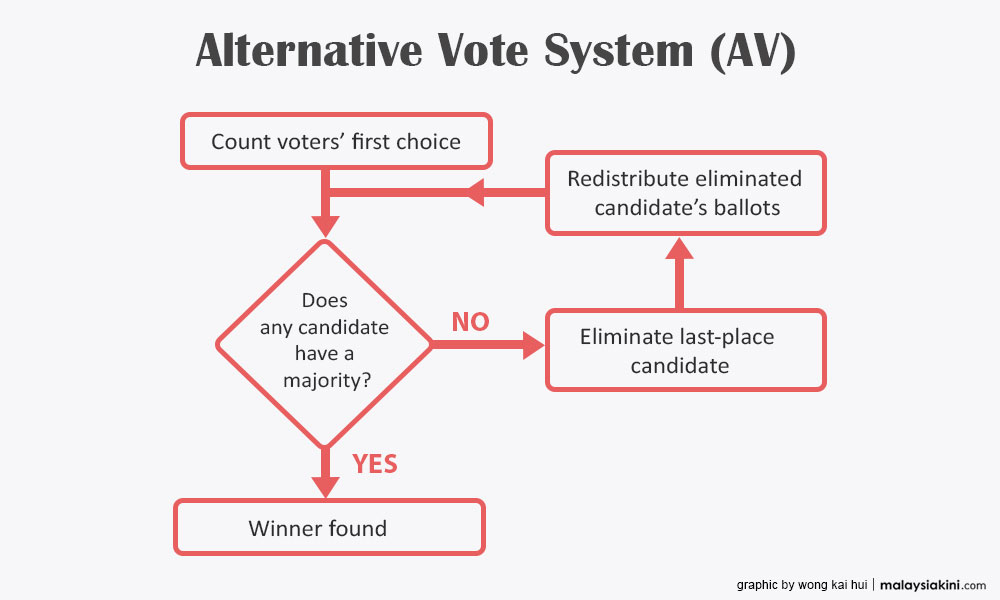
The SV system is also a majoritarian one, meaning that a candidate who secures an absolute majority of primary votes will win.
In the event no candidate secures an absolute majority of primary votes,
then all but the two leading candidates are eliminated and there is a second count.
In the second count, the votes of those who supported eliminated candidates are distributed among the two remaining candidates, so that one candidate achieves an absolute majority. It is not possible to have more than two rounds of counting.
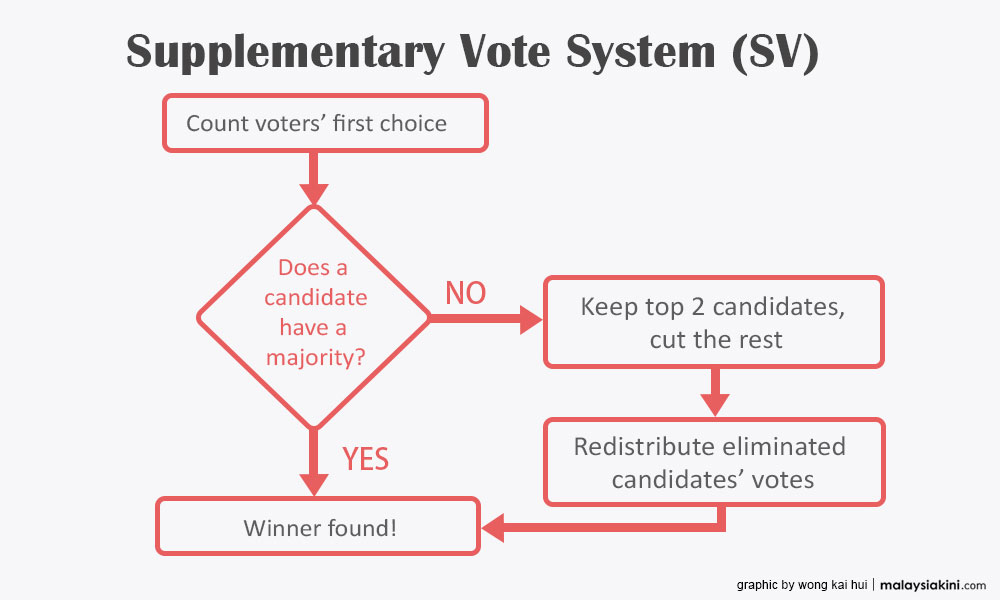
What are the advantages of preferential voting?
Based on the Tropical Garden example, being a "second choice" or "third choice" may help a candidate overturn the initial results in the first count.
Compared to FPTP, voters disclose more information in the preferential voting system.
Additionally, the winner must secure more than 50 percent of support from the people.
As the second or third choice will also be counted in a preferential voting system, political parties have more incentive to broaden their appeal, Reilly explained.
In order to win the election, political parties have to reach out more to other groups, and they will compete to push each other towards the centre, and encourage the politics of moderation, instead of extremism.
"Most countries don't wish for ethnic politics as their foundation. Democracy works with an implicit understanding that there are the 'median voters'. There is an assumption that a small proportion will be the extreme right, and a small proportion will be the extreme left. The median is at the middle," said Reilly.
"When political parties are trying to win the government, they target their election campaign (towards) trying to find the median, who is exactly between the left and the right. They draft their policy to appeal these persons and there will be a fight to the political centre."
"In an ethnically polarised society, unfortunately, we get the opposite impact of competing for the political centre.
“As soon as there is more than one party coalition competing over ethnicity, there are always political incentives or the temptation for a politician to go more extreme, because you can then accuse another party of 'selling out your ethnic group', or 'threatening your ethnic group', or 'threatening your identity' to get support."
"Instead of pushing to the centre, you are pushing outwards. Ethnicity is potentially a big problem in an ethnically polarised society, it can be a threat to democracy like in Malaysia now," he added.
The political scientist, who has advised over 20 countries on issues of electoral system design and constitutional reform, concluded that the preferential voting system will provide incentives in favour of moderation.
What are the disadvantages of preferential voting?
Based on Reilly's argument, there is an assumption that a constituency is a mixed seat in terms of ethnicity. Besides that, he also presumes that the majority of a society prefers the politics of moderation, instead of extremism.
However, if most people support extremism, then the preferential system will not help encourage moderation.
"The idea of the preferential system is to help to reach the median voters; if the majority of the society is quite inclusive, then that is strong enough to kill off or to marginalise the extremist party."
"But, it is a double-edged sword. The danger is that if you have an electorate, maybe a rural seat, where most of the voters prefer a religiously conservative or ethnically extreme party, then the extremist party will not be excluded. It always depends."

In fact, many constituencies in Malaysia are dominated by specific ethnic groups.
Regardless of problems involving electoral boundary manipulation, most constituencies on the east coast of Peninsular Malaysia are Malay-dominant seats, while 70 percent of voters in several electorates in Penang are ethnic Chinese. The ideal "mixed seats" are mostly located in urban areas.
Gerrymandering or malapportionment of district boundaries can create more ethnically homogenous constituencies, which result in specific ethnicities dominating certain seats.
In such cases, candidates have even less reason to broaden their appeal, as there is no incentive to be neutral and moderate.
Unfavourable for small parties
As the preferential voting system is still a majority voting system, but not a proportional representation system, the percentage of seats obtained still doesn't reflect the percentage of votes.
For example, under the preferential voting system, party L wins a total of five percent of votes across the country. However, its supporters are scattered all over the country and it loses in every constituency.
Although L secures five percent of the vote, it does not gain a single seat in Parliament.
This seems to deviate from the fundamental principle of representative democracy, which ensures the "fair representation" of different groups in the legislature.
In other words, the preferential voting system has a similar inadequacy to our current FPTP system, in that it is unfavourable to small parties.
Minority parties may find themselves excluded, such as those which are issue-based or advocate for the rights of various groups like women, farmers, labourers, indigenous people, or sexual minorities.
Comparing two possible systems
Previously, the mixed-member proportional representation (MMP) was the electoral system most commonly proposed as an alternative to FPTP by civil society groups, activists and scholars.
It was proposed by the former chairperson of Bersih, Maria Chin Abdullah, think tank Political Studies for Change (KPRU) and political scientist Wong Chin Huat.
Wong was also present during Reilly's joint interview with selected media. The two discussed the pros and cons of their own proposals, with the main points listed below:
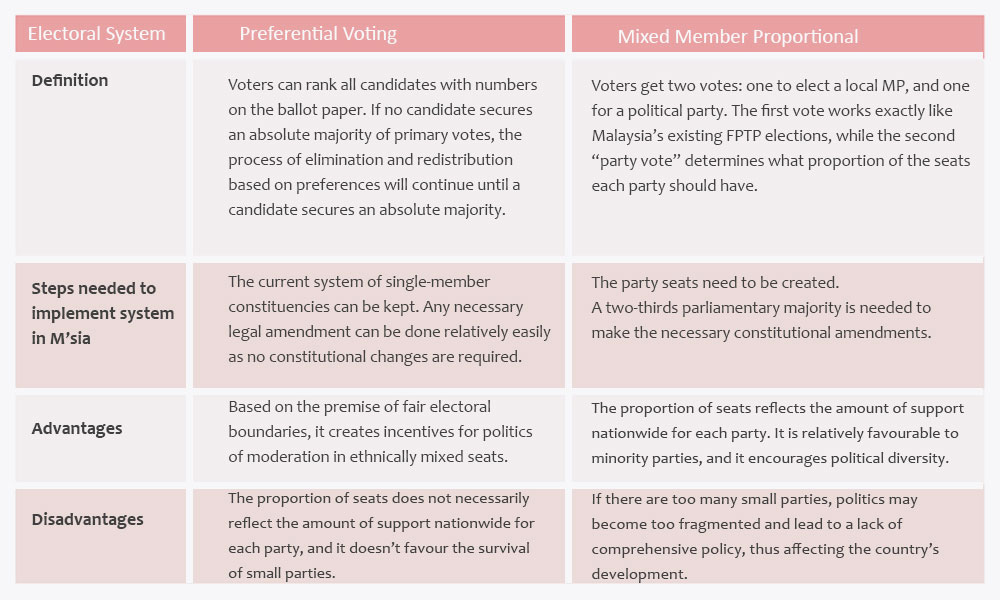
Pros and cons of multiple small parties
By ensuring the survival of small and single-issue parties, the MMP system makes politics more diverse. It also encourages citizens of all races to have diverse stands on all kinds of issues, instead of being trapped within the discourse of ethnic politics, Wong explained.
However, Reilly pointed out the downside of the MMP system. “The consensus among scholars is that, when there are too many political parties with a very fragmented government, it is not good for economic development; you are better off having few parties and maybe a strong single party.”
Additionally, small parties may seek a reward in return for joining a coalition, says Reilly.
Small parties also tend to think about the interest of specific groups of people, leading to a lack of comprehensive views in the policymaking process, Reilly added.
"Maybe they will try to deliver benefits to their voters, but not for overall (public). And if you have too much of this, it will not have a good outcome."
In response to this, Wong (below) agreed that if Malaysia’s politics was overly fragmented, some real talents may be sacrificed in favour of reaching a compromise with other parties to form a coalition government.
"(In) the worst case, you will have many very fragmented parties, you can have a coalition, but the prime minister will have a harder choice in getting the best talented people, because you need to satisfy so many parties.”

Can negotiations exclude extremists?
Meanwhile, Wong added that as the MMP system could result in a government which consists of varied ideologies, Parliament would be unable to forcibly pass any bill. Hence, any reform or change would take a long time to pursue.
"Everything will stay for one more generation. We need to archive some consensus, it means that you cannot push anything down or have fast reform. (With an MMP system) we have to start talking seriously about all the issues to find a consensus,” says Wong.
He also mentioned that the process of negotiating to form a government would help to exclude parties which have radical or extremist stands, and also create political incentives for the parties to be moderate.
Moderation not necessarily encouraged
However, there are examples of elections using the MMP system which have seen extremist political parties claiming victory.
Reilly cited the example of the European Parliament election in May 2019, where the far-right Brexit Party received a high number of votes and seats.
"There are a lot of people who don't like proportional representation because it allows more extreme views to exist in Parliament, which under FPTP cannot get any representation at all."
Reilly concluded that the proportional system reflects the nature of a society or a country. "If extremism already exists in this country, including very far-left or far-right views, the proportional system will reflect that."
Poll: Which electoral system do you prefer? Vote below:
-Mkini



No comments:
Post a Comment
Note: Only a member of this blog may post a comment.